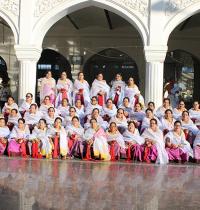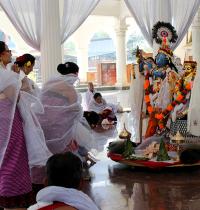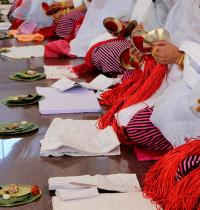Rekha Konsam
Grant Period: over one year and six months
Rekha Konsam is a Research Scholar at the Department of Sociology, Delhi School of Economics, Delhi University. She has presented papers at various conferences and seminars at Bhopal, Bangalore, Shillong, Delhi and Vienna. Apart from this, she has also authored several essays and articles which have been published in various national and international publications.
This grant will enable Rekha to look at the Raseshori Pala of the Sankirtan tradition – the first group of women Sankirtan performers of Manipur. The tradition of the Raseshori Pala was set up under the aegis of Maharaja Bhagyanchandra (1748–1799) of Manipur. The group comprised of women of the royal family and the first performance of the Raseshori Pala was led by his daughter Princess Bimbavati, structured along the lines of Raslila. To this day, the members of the group are women who directly trace their ancestry to the royal line, born into the patrilineal descent and their daughters. It does not extend further to their next generation, to women married into the fold, or to descendants of another line within the royal lineage. In its performance, it observes certain traditions unique to it. Unlike other Sankirtan performances, the Raseshori Pala is not usually very lengthy and is preceded and followed by the Sankirtan of a male group of the royal family.
Through this project, Rekha will conduct a critical examination of the role of women in the Manipuri society in the context of performative traditions focusing on the Raseshori Pala. While it is an undeniable fact that women have had a significant place in Manipuri performance traditions, there are few studies of their contributions to practice. The proposed study would primarily be concerned with the way this form of Sankirtan is carried forward as ‘tradition’ by women - the ways of conduct, etiquette, aesthetic as also the hierarchy, status and social organisation of its context. This research also attempts to shift focus from the dominant trajectory of associating Hinduism in Manipur by enquiring into the Raseshori Pala, thus drawing attention to the history of Vaishnavism in the state and its artistic devotional expression through the contribution of women. The research will explore ways in which ‘tradition’ is observed and performed through this community of women as custodians in maintaining and carrying forward the artistic expression of devotion.
Rekha also aims to look at the challenges of passing on this tradition through generations – of songs that are not in the familiar Manipuri language but said to be a form of Braj; of tunes without notations that differ from the more common ones of other Sankirtan; and the rules and hierarchies within which it is embedded. The similarities and differences between the exclusiveness of the group as comprising of women belonging to a distinct social class and women engaged in the performative traditions within the same Manipuri tradition, for instance, professionally trained Sankirtan singers who are ritual specialists of the folk religion, will also be explored.
Since the documentation on the Raseshori Pala has been poor and the literature on it is limited, Rekha will primarily focus on the main group of performers as her key sources. She will conduct interviews and attend their meetings and practice sessions in order to understand the practice. The first-hand observation will allow her to explore how the members of the group see themselves as carrying forward a legacy. She will closely follow Dr Jamini Devi who has authored four books on the Raseshori Pala and is also the secretary of the group. Besides this, she will interview Sankirtan teachers and performers from Jawaharlal Nehru Manipuri Dance Academy and Manipur University and attend two important events of the Raseshori Pala that are organised to commemorate the birth and death anniversaries of Maharaja Bhagyanchandra every year. Apart from this, she will visit the archives and libraries of the Manipur Sangeet Kala Akademi, Sangeet Natak Akademi and Indira Gandhi National Center for the Arts to procure materials related to Manipuri performative arts.
IFA’s decision for making this grant comes from our interest in supporting research projects that investigate marginalised or relatively unexplored areas in the arts, and offer new readings of artistic practices. The outcome of this project will be a monograph. A photo documentation of the rehearsals and performance along with the monograph will be submitted as deliverable to IFA by the grantee.




